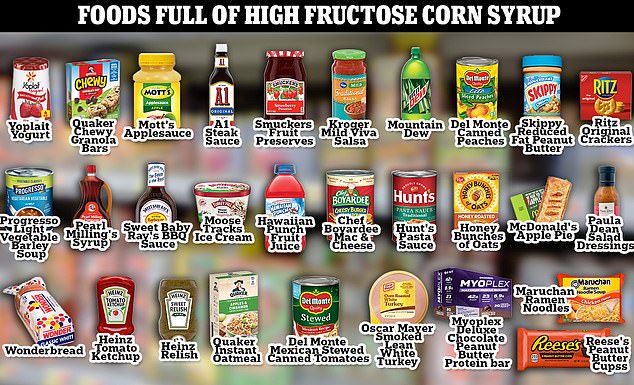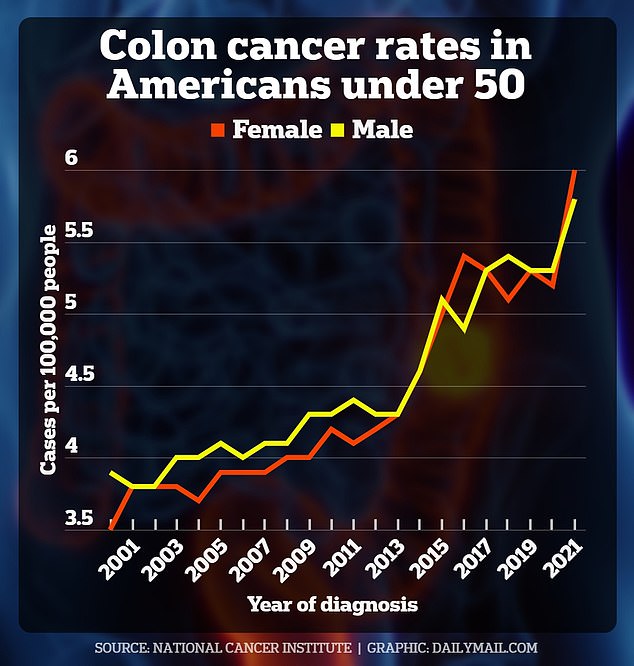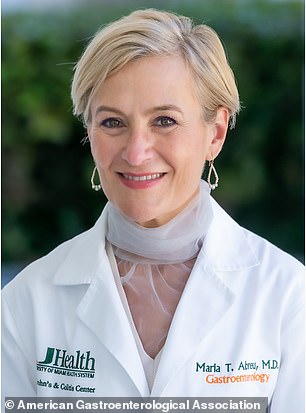Dr. Maria Abreu, a gastroenterologist at the University of Miami, shared that colon cancer prevention should begin at any early age.
Dr. Maria Abreu is at the forefront of one of the greatest health tragedies of a generation.
Over the past decade, the Miami gastroenterologist has diagnosed an increasing number of young people with colon cancer, once considered a disease of older people.
Obesity, sedentary lifestyles and ultra-processed foods have long been blamed for the rise in the disease, but Dr. Abreu said she is seeing people in their 20s and 30s who eat healthily and stay fit developing the disease.
She is convinced there is more to the story.
Dr Abreu, who is also president of the American Gastroenterological Association, told DailyMail.com she believes two additives that became common in the 1970s and are rarely talked about in connection with the colon cancer crisis could be behind the rise.
The first is high fructose corn syrup, a liquid sweetener unique to the United States and not used in other countries.
It is most commonly associated with junk foods like soft drinks and desserts, but has also found its way into “healthier” foods like salad dressings, oatmeal, fruit juices, cereals, and bread.

High fructose corn syrup is extremely common in popular foods because a small amount is incredibly sweet, making it profitable for food manufacturers.

The graph above shows the rise in colorectal cancer in Americans under age 50 over the past two decades.
High fructose corn syrup was introduced in the 1970s as an attempt to stabilize food prices. At the time, President Richard Nixon authorized subsidizing corn crops to encourage farmers to grow more of it.
That glut led to the development of high-fructose corn syrup, which became cheaper to produce than sugar, so it ended up everywhere.
The other ingredient is emulsifiers, which are used to give foods a creamy texture and are found in healthy foods such as low-fat yogurt, cottage cheese, and peanut butter.
Dr. Abreu said these ingredients wreak havoc on the microbiome, a network of healthy bacteria in our guts.
When this delicate ecosystem is damaged, it reduces our ability to protect the digestive tract from pathogens that irritate our cells and create inflammation.
Over time, this inflammation can cause premalignant cells to form and multiply rapidly, a process called proliferation.
Chronic inflammation can also lead to inflammatory bowel diseases, such as Crohn’s disease and ulcerative colitis, which Dr. Abreu says “significantly” increase the risk of colon cancer.
He points out that the introduction of high fructose corn syrup and emulsifiers in the 1970s and 1980s may explain why so many adults in their 40s are developing colon cancer at record rates.
Data indicate that more than 50,000 Americans are expected to die from colorectal cancer this year. And for young people, the number is expected to double between 2010 and 2030.
Rates in people under 50 have also increased by about two percent per year since the early 2000s.
The United States has the sixth-highest rate of early-onset cancers (disease in people under age 50), with 87 cases per 100,000 people under age 50, and colon cancer is one of the fastest growing.
Researchers at the University of Missouri-Kansas City recently analyzed colorectal cancer rates in people ages 10 to 44 over the past two decades and found that cases had increased across all age groups.
The rate of colorectal cancer increased by 500 percent among children aged 10 to 14 and by 333 percent among adolescents aged 15 to 19.
Rates rose 71 percent among people ages 30 to 34, to seven cases per 100,000 people. Among people ages 35 to 39, rates rose 58 percent, to 12 cases per 100,000 people.
Dr. Abreu said, “Chronic inflammation drives colon cancer, and I suspect that’s transformative in this new rise in young people developing colon cancer.”
He noted that similar effects have been observed with emulsifiers.
Emulsifiers are common additives that help dairy-free and low-fat or fat-free foods have a creamy, blended texture. Ice cream and cream cheese are some of the most common foods that contain these additives.
Common emulsifiers include soy lecithin, sucralose, xanthan gum, carrageenan, maltodextrin, and polysorbate, all of which appear on ingredient labels.


Joe Faratzis, 34, of Los Angeles, is pictured above in his early 20s before he was diagnosed with stage 4 colon cancer (left) and during treatment he began in 2020 (right).
Dr Abreu said: “One of the things that has changed dramatically in our food supply is the addition of emulsifiers.”
A 2021 study published in the journal Journal of Physiology They found that six-week-old mice (the equivalent of a human teenager) fed diets rich in high-fructose corn syrup showed “profound” changes in their microbiome.
As for emulsifiers, one Study 2022 It was discovered that when mice were fed diets rich in emulsifiers, their offspring suffered a breakdown of their intestinal barrier, leading to inflammation. The mice in the experiment were three weeks old, the equivalent of a human baby.
Dr. Abreu noted that this could be because children’s microbiomes are not as diverse and stable as those of adults, so additives such as emulsifiers and high-fructose corn syrup could have a greater impact on them than on adults.
To reduce both additives, she recommends that parents avoid pre-flavored or pre-sweetened foods and instead add sweeteners or flavors at home.
She uses Greek yogurt as an example.
While the breakfast staple is high in healthy bacteria called probiotics, which help regulate the microbiome, flavored varieties can be sweetened with high-fructose corn syrup.
Dr. Abreu said: “I don’t want to say that yogurt is bad for your health. Yogurt is one of the best things you can buy.
“Greek yogurt, made naturally, can be a wonderful snack for some people, but if you start eating products that have more sugar and milk than yogurt, that changes our gut bacteria.”
Instead, she suggests buying plain, unsweetened varieties and adding your own toppings like honey, granola and fruit to make it taste better.
“Even if you added table sugar to it, it would still have a lot less sugar than what they’ve added to it,” she said.
“Homemade food is still so much better.”
However, other experts are not so sure that all of these additives are bad.
While high fructose corn syrup has no known health benefits, some experts have claimed that it is not harmful to health as long as the rest of the diet is balanced.
Daniel Feldman, a registered dietitian in New York, said in an interview with gynecologist Dr. Jen Gunter: ‘If other aspects of your nutrition are in order (total calories, macronutrients, vitamins, minerals, fiber and water), then there is no need to worry about HFCS.


Laurie Koshers, pictured above with two of her children, was diagnosed with stage 3 colon cancer at age 44. Ms. Koshers was a lifelong vegetarian and an avid runner, so her cancer diagnosis came as a surprise.
That said, since HFCS is a sweetener found in processed foods, and processed foods tend to be less nutrient-dense and more calorie-dense than unprocessed foods, foods with HFCS should generally make up a small portion of your diet (especially if your goal is weight loss).
“But there is nothing inherently wrong with HFCS.”
And when it comes to emulsifiers, Abbey Sharp, a myth-busting dietitian with more than 800,000 followers on TikTok, said on TikTok that these are typically only added to foods in small amounts and have not been well tested in humans.
For both additives, Dr. Abreu said, “I think it’s good to convey to parents that they should expose their children to these things as little as possible.
“I believe that colon cancer is preventable. Part of that has to start by getting this message across to parents, because we believe that it starts at a very early stage.
“It takes a lifetime of making good decisions.”

